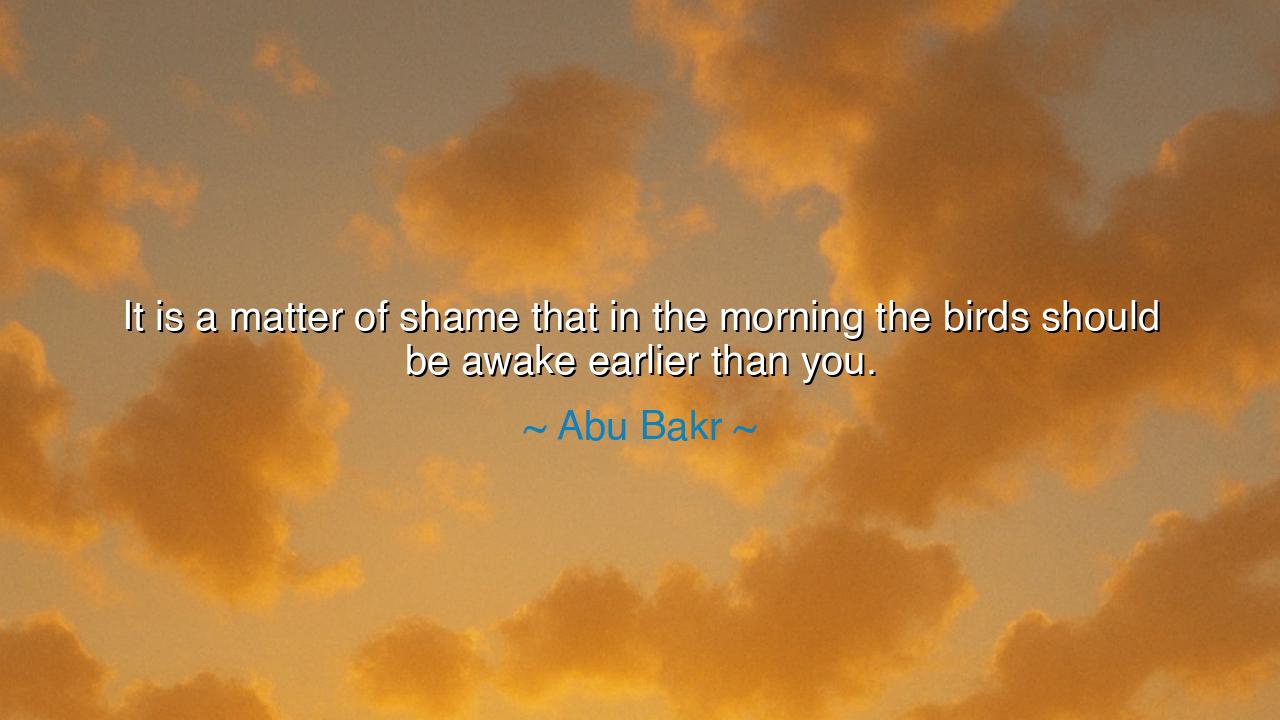
It is a matter of shame that in the morning the birds should be
It is a matter of shame that in the morning the birds should be awake earlier than you.






Abu Bakr, the noble companion of the Prophet and the first Caliph of Islam, once declared with piercing clarity: “It is a matter of shame that in the morning the birds should be awake earlier than you.” These words, simple in form, carry the weight of a timeless teaching. For they call men and women alike to rise with purpose, to greet the dawn not with slumber but with readiness, and to live in harmony with the divine rhythm of creation. The birds, those humble creatures of the sky, awaken to their duties with the first light; how then can mankind, honored above creation with mind and spirit, lie idle in their beds while the world begins its labor?
The origin of this saying lies in the culture of discipline, faith, and devotion that Abu Bakr embodied. In the early days of Islam, life itself was a struggle for survival and for the spreading of truth. To waste time in sleep while the sun rose was to squander opportunity and to neglect the blessings of God. Thus, Abu Bakr’s rebuke was not against sleep itself, but against idleness—the failure to embrace the morning as the hour of strength, clarity, and new beginnings.
The ancients across many lands knew this truth well. The Romans trained their soldiers to march at dawn, believing that fortune favored those who seized the early hours. Farmers in every age have risen with the sun to sow and reap, knowing that their livelihood depends on the first light of the day. In Japan, the samurai practiced meditation and sword drills before sunrise, sharpening not only their blades but their spirits. In all traditions, the morning belongs to the diligent, and Abu Bakr’s words remind us of this eternal law.
Consider also the lesson of Benjamin Franklin, who centuries later echoed this same wisdom: “Early to bed and early to rise makes a man healthy, wealthy, and wise.” Though he lived in another land and another time, he too recognized that the morning carries power. The quiet hours before the world stirs are a gift—an opportunity to plan, to pray, to work without distraction. Those who waste them in sleep find themselves forever chasing the day, while those who rise early lead it.
Abu Bakr’s words also carry a sense of humility. If even the birds, with their small bodies and fragile lives, honor the morning with song and flight, how much more should man, blessed with intellect and purpose, rise to his calling? To awaken late while the birds are already at work is not only laziness—it is a shame, a betrayal of one’s higher potential. For nature itself becomes a teacher, and creation a mirror, showing us that diligence is the true path to honor.
The lesson for us, then, is clear: guard your mornings. Do not surrender them to sloth or delay. Wake with the light, and dedicate those first moments to what matters most—whether prayer, reflection, study, or labor. Let your mornings set the tone for your day, for he who begins with discipline continues with strength. If the birds, small as they are, can rise joyfully to their tasks, then so too can we rise with courage to face our duties.
Therefore, take this wisdom into your life: treat it as shameful to sleep away the dawn. For the morning is the forge of destiny, the hour when mind is sharpest and spirit is strongest. Do not let the humble bird outpace you in devotion and diligence. Instead, join creation in honoring the sunrise, and make of each dawn a victory.
And so Abu Bakr’s words endure as a call across the ages: rise early, live with purpose, and let the morning be your ally. For those who master the dawn master their lives, and those who waste it are mastered by regret.






AAdministratorAdministrator
Welcome, honored guests. Please leave a comment, we will respond soon